
Otto Abels Harbach, born Otto Abels Hauerbach was an American lyricist and librettist of nearly 50 musical comedies and operettas. Harbach collaborated as lyricist or librettist with many of the leading Broadway composers of the early 20th century, including Jerome Kern, Louis Hirsch, Herbert Stothart, Vincent Youmans, George Gershwin, and Sigmund Romberg. Harbach believed that music, lyrics, and story should be closely connected, and, as Oscar Hammerstein II's mentor, he encouraged Hammerstein to write musicals in this manner. Harbach is considered one of the first great Broadway lyricists, and he helped raise the status of the lyricist in an age more concerned with music, spectacle, and stars. Some of his more famous lyrics are "Smoke Gets in Your Eyes", "Indian Love Call" and "Cuddle up a Little Closer, Lovey Mine".
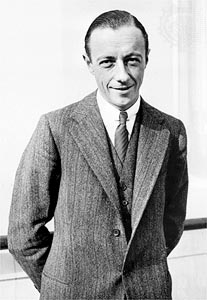
Vincent Millie Youmans was an American Broadway composer and producer.
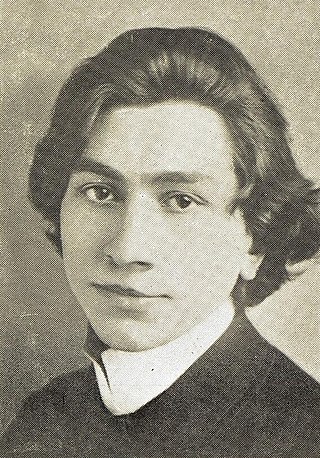
Charles Rudolf Friml was a Czech-born composer of operettas, musicals, songs and piano pieces, as well as a pianist. After musical training and a brief performing career in his native Prague, Friml moved to the United States, where he became a composer. His best-known works are Rose-Marie and The Vagabond King, each of which enjoyed success on Broadway and in London and were adapted for film.
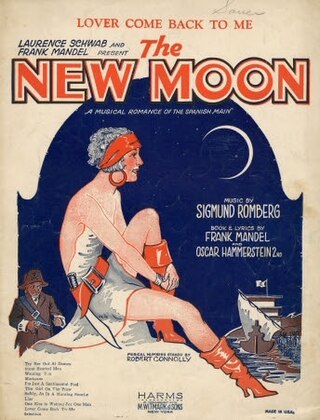
The New Moon is an operetta with music by Sigmund Romberg, lyrics by Oscar Hammerstein II and book by Oscar Hammerstein II, Frank Mandel, and Laurence Schwab. The show was the third in a string of Broadway hits for Romberg written in the style of Viennese operetta. Set in 1792, shortly before the French Revolution, the story centers on a young French aristocrat in disguise, who has fled his country and falls in love with the daughter of a prominent New Orleans planter.

Rose-Marie is an operetta-style musical with music by Rudolf Friml and Herbert Stothart, and book and lyrics by Otto Harbach and Oscar Hammerstein II. The story is set in the Canadian Rocky Mountains and concerns Rose-Marie La Flemme, a French Canadian girl who loves miner Jim Kenyon. When Jim falls under suspicion for murder, her brother Emile plans for Rose-Marie to marry Edward Hawley, a city man.
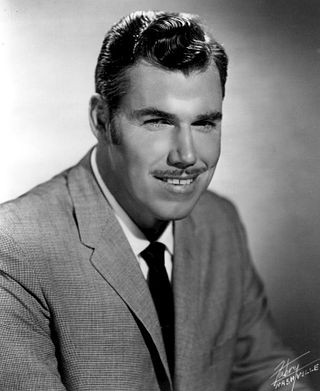
Ottis Dewey "Slim" Whitman Jr. was an American country music singer-songwriter and guitarist known for his yodeling abilities and his use of falsetto. Recorded figures show 70 million sales, during a career that spanned more than seven decades. His prolific output included more than 100 albums and around 500 recorded songs; these consisted of country music, contemporary gospel, Broadway show tunes, love songs, and standards. Soon after being signed, in the 1950s Whitman toured with Elvis Presley.

Annunzio Paolo Mantovani was an Italian British conductor, composer and light orchestra-styled entertainer with a cascading strings musical signature.

"Here in My Heart" is a popular song written by Pat Genaro, Lou Levinson, and Bill Borrelli, first published in 1952.

"(Everything I Do) I Do It for You" is a song by Canadian singer-songwriter Bryan Adams. Written by Adams, Michael Kamen, and Robert John "Mutt" Lange, the power ballad was the lead single for both the soundtrack album from the 1991 film Robin Hood: Prince of Thieves and Adams's sixth studio album, Waking Up the Neighbours (1991). The single was released on June 17, 1991, by A&M and the accompanying music video was directed by Julien Temple.

Little Mary Sunshine is a musical that parodies old-fashioned operettas and musicals. The book, music, and lyrics are by Rick Besoyan. The original Off-Broadway production premiered November 18, 1959 at the Orpheum Theatre in New York City's East Village. Staying in the neighborhood, it moved to the Player's Theatre on June 21, 1961, then, finally, to the Cherry Lane Theatre on March 21, 1962. Closing was Sept. 2, 1962. Combined run was 1,143 performances. It was seen briefly in a West End production in 1962 and has become a popular show for amateur and semi-professional groups in the United States and elsewhere.
Rose Marie (1923–2017) was an American actress.
"I Remember You" is a popular song, published in 1941. The music was written by Victor Schertzinger, with lyrics by Johnny Mercer. The song was originally recorded by Jimmy Dorsey in 1941. It has since been covered most notably by Frank Ifield, Glen Campbell, Björk and George Michael.

The Vagabond King is a 1925 operetta by Rudolf Friml in four acts, with a book and lyrics by Brian Hooker and William H. Post, based upon Justin Huntly McCarthy's 1901 romantic novel and play If I Were King. The story is a fictionalized episode in the life of the 15th-century poet and thief François Villon, centering on his wooing of Katherine De Vaucelles, and relating how he becomes “king for a day” and defends France against the invading forces of the Duke of Burgundy.
Herbert Pope Stothart was an American songwriter, arranger, conductor, and composer. He was nominated for twelve Academy Awards and won Best Original Score for The Wizard of Oz. Stothart was widely acknowledged as a prominent member of the top tier of Hollywood composers during the 1930s and 1940s.

The Firefly was the first operetta written by composer Rudolf Friml, with a libretto by Otto Harbach. The story concerns a young Italian girl, who is a street singer in New York. She disguises herself and serves as a cabin boy on a ship to Bermuda, where she falls in love. Complications arise, and eventually, she becomes a grand opera diva.
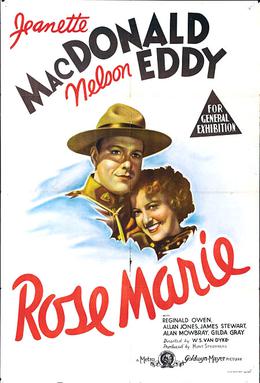
Rose Marie is a 1936 American musical Western film directed by W. S. Van Dyke and starring Jeanette MacDonald, Nelson Eddy and Reginald Owen. It is the second of three Metro-Goldwyn-Mayer film adaptations of the 1924 Broadway musical of the same name. A silent version was released in 1928 and a color film in 1954. All three versions are set in the Canadian wilderness. Portions of Rudolf Friml and Herbert Stothart's original score for the Broadway musical are included in both the 1936 and 1954 films.
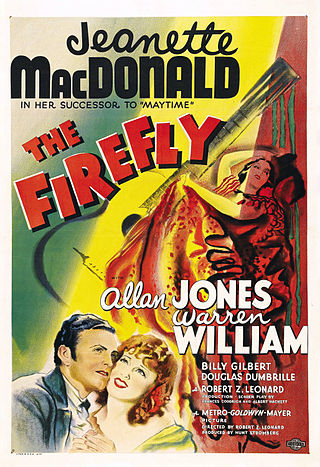
The Firefly is a 1937 American historical musical film directed by Robert Z. Leonard and starring Jeanette MacDonald, Allan Jones and Warren William. The film is an adaptation of the operetta of the same name by composer Rudolf Friml and librettist Otto A. Harbach that premiered on Broadway in 1912. The film used nearly all of the music from the operetta but jettisoned the plot in favor of a new storyline set in Spain during the time of the Emperor Napoleon I. It added a new song, "The Donkey Serenade", which became extremely popular, as was one of the Friml songs, "Giannina Mia". The original release prints of the film were elaborately tinted with Sepia-Blue, Sepia-Orange and Sepia-Blue-Pink.

"Indian Love Call" is a popular song from Rose-Marie, a 1924 operetta-style Broadway musical with music by Rudolf Friml and Herbert Stothart, and book and lyrics by Otto Harbach and Oscar Hammerstein II. Originally written for Mary Ellis, the song achieved continued popularity under other artists and has been called Friml's best-remembered work.

Rose-Marie is a 1928 American silent drama film directed by Lucien Hubbard. It was the first of three Metro-Goldwyn-Mayer adaptations of the 1924 operetta Broadway musical Rose-Marie. The best-known film adaptation starring Nelson Eddy and Jeanette MacDonald was released in 1936; another film was released in 1954. All three versions are set in the Canadian wilderness.
















